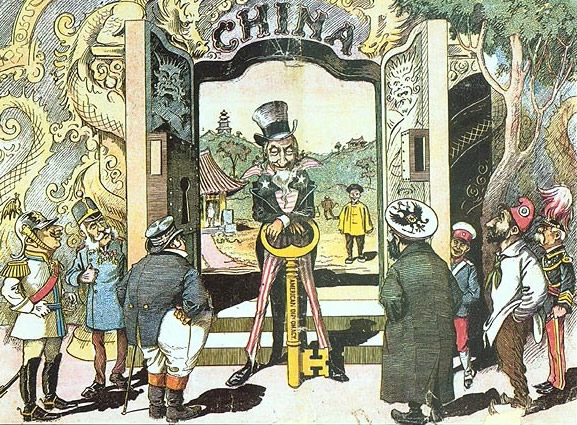 |
| Open Door Policy |
China's catastrophic defeat in the Sino-Japanese War (1894–95) and its growing political and military weakness led to a scramble for concessions by Western powers that seemed to presage its eventual partition.
The movement began in 1898 with Germany's successful demand to the Qing (Ch'ing) government for a 99year lease of Jiaozhou (Kiaochow) as a naval base in Shandong (Shantung) Province, the right to build a railway between that port and Jinan (Chinan), the provincial capital, and numerous mining and other rights. Shandong became a German sphere of influence as a result.
Russia followed by obtaining similar privileges and concessions in the northeastern provinces (Manchuria) and Mongolia, and France in the south and southwestern provinces (Guangdong, Guangxi, and Yunnan) that adjoined French Indochina
  |
Great Britain dominated China's foreign trade, amounting to 60 percent of its total imports and exports. While it feared the division of China into spheres of influence would damage British trade, it nevertheless moved to establish a sphere in the Yangzi (Yangtze) River valley and in areas near Hong Kong.
The United States had not demanded a sphere of influence in China, did not have major trading interests in China, but feared that Western powers might impose discriminatory tariffs in areas under their influence.
These concerns prompted W. W. Rockhill, private adviser on Far Eastern affairs to Secretary of State John Hay
This, the First Open Door Note, had three points: First, no country would interfere with the interests of others in its sphere of influence; second, no country would discriminate against the nationals of other countries by charging them different railway and harbor dues; and third, tariffs stipulated by treaties would be collected by the Chinese government within Western spheres of influence.
Despite receiving evasive and equivocal replies and no unqualified support from any country, Hay nevertheless announced on March 20, 1900, that all had given their "final and definitive" assent.
The Boxer Rebellion in China precipitated an international intervention in 1900 that threatened to carve up the country. Thereupon, Hay issued the Second Open Door Note on July 3, 1900, in which the United States stated its goal as: to "preserve Chinese territorial and administrative integrity, protect all rights guaranteed to friendly powers by treaty and international law, and safe guard for the world the principle of equal and impartial trade with all parts of the Chinese Empire." Hay did not solicit responses from the other powers on this declaration of principle.
The Open Door policy became one of the cornerstones of U.S. policy regarding China. It was embodied in the Washington Nine Power Treaty in 1922 and the Stimson Doctrine of Non-Recognition of Japan's conquest and installation of a puppet government in Manchuria after 1931.